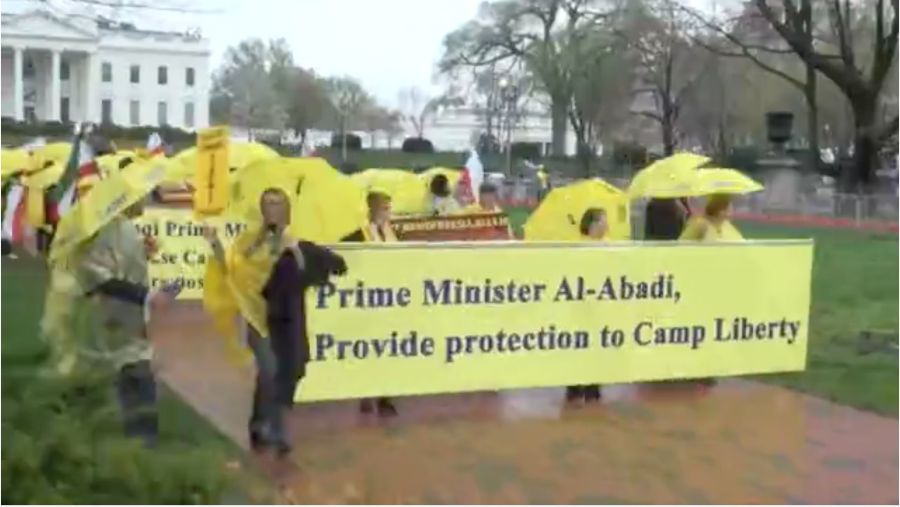
Protestors rallied outside the White House on Tuesday, calling for the U.S. to protect 2,500 Mojahedin-e-Khalq (MEK) at Camp Liberty in Iraq. (Mary Lee/MEDILL)
WASHINGTON — In a meeting with the Iraqi Prime Minister, President Obama pledged $200 million in humanitarian aid Tuesday for Iraqis displaced by fighting with the Islamic State.
Not part of the agenda was the fate of approximately 2,500 members of the Mujahedeen-e-Khalq, or MEK, an exiled Iranian dissident group stranded at the former U.S. military base Camp Liberty in Baghdad.
In front of the White House on rain-drenched Pennsylvania Avenue, approximately 200 Iranian Americans, former U.S. military officers, and family members of the MEK rallied to call on Obama and Iraqi Prime Minister Haider al-Abadi to guarantee the safety and security of the group.
“The MEK worked very, very hard to help protect my soldiers and Marines,” said retired U.S. Army Col. Wes Martin, who worked closely with the MEK at Camp Ashraf, Iraq during his 2003-2004 deployment.
“I know dozens of my troops were able to come back home to their families because of the work they did; we owe them,” Martin said.
White House security promptly forced the crowd beyond Lafayette Park, across the street from the executive mansion- to continue the rally a block away.
The MEK faces a dire situation at Camp Liberty, with minimal access to essential services such as food, water and medical care and periodic attacks by pro-Iranian militias.
Following the 2003 invasion of Iraq, the U.S. government pledged to support the group despite its official designation as a Foreign Terrorist Organization and its previous alliance with Saddam Hussein. At the time, the U.S. declared MEK members “protected persons” under the Geneva Conventions.
In 2009, however, the U.S. transferred care of the MEK to the Iraqi government of Prime Minister Nouri al-Maliki, whose preferential sectarian policies helped precipitate the current crisis with the Islamic State.
“With the deteriorating situation in Iraq, the rise of ISIS and the ascendancy of pro-Iranian militia groups, the residents of Camp Liberty are under enormous danger,” said Ali Savavi, representative for the National Council of Resistance of Iran.
Al-Abadi’s designation as Iraqi Prime Minister in August 2014 raised new hopes that the residents of Camp Liberty would begin to receive Iraqi government support, though this has yet to materialize.
The plight of the MEK has attracted the attention of several prominent Americans.
In a letter to al-Abadi dated April 8, 2015, 34 former senior US government officials and military leaders called for al-Abadi to “personally intervene to stop the continued harassment of the residents [of Camp Liberty] by individuals in charge of security in the Camp, and the impeding of access to medical care.”
Signatories to the letter include former U.S. Army Chief of Staff George Casey, former CIA and NSA director Gen. Michael Hayden, former New York City Mayor Rudy Giuliani, and former FBI director Louis Freeh.
“As of this writing,” the letter notes, “24 Camp Liberty residents have died because they were prevented from getting timely access to needed medical care, and 1,300 are still coping with injuries from past rocket attacks.”
The MEK’s designation as a terrorist organization was rescinded by the State Department in September 2012. The group fled Iran in the wake of the 1979 Islamic Revolution and has been in Iraq ever since.





